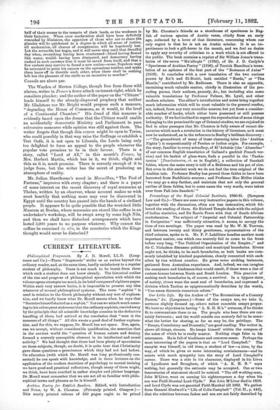Proceedings of the Royal Colonial Institute, 1880-81. (Sampson Low and
Co.)—There are some very instructive papers in this volume, together with the discussions, often not less instructive, which fol- lowed the reading of them. Sir Richard Temple deals with the subject of Indian statistics, and Sir Bartle Frere with that of South-African. confederation. The subject of " Imperial and Colonial Partnership- in Emigration" was sufficiently attractive, it seems, to occupy the time of two meetings. The paper was read by Mr. W. M. Torrens, and between twenty and thirty gentlemen, representatives of the chief colonies, spoke to it. Mr. F. P. Labilliere handles another mesh important matter, one which can scarcely fail to come to the front before very long, " The Political Organisation of the Empire ;" an Sir C. Nicholson discusses political and municipal boundaries. Rivers ought not, he thinks, to be each boundaries, as both banks are com- monly inhabited by kindred populations, closely connected with each- other by ties without number. He gives some striking instances,. gathered from Australian experience. And, indeed, we can Imagine. the annoyance and hindrance that would result, if there were a line of custom-houses between North and South London. This practice of making such boundaries is, of course, a survival. In a bygone state. of society, rivers were the most real of boundaries, and expressed a division which Tacitus so epigrammatically describes by the words,. "Uno amne discretis connexum odium."














































 Previous page
Previous page